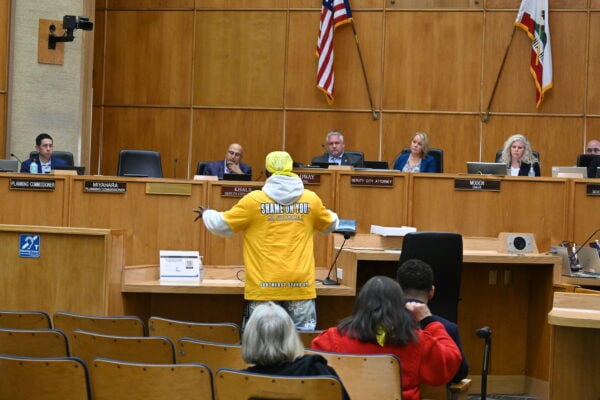
By Macy Meinhardt, Voice & Viewpoint Staff Writer
“You all, and everyone else in your community needs to show up at city council to voice your game. That’s how you’re going to get the action that you really want to happen here,” said Planning Commissioner Dennis Otsuji during last month’s Planning Commission meeting to discuss Footnote 7.
In the next coming weeks, the San Diego City Council will produce a final vote on the removal of Footnote 7, a regulation within city zoning laws that allows for an increase in housing density exclusive to neighborhoods in Southeastern San Diego.
The footnote served as the basis for two housing projects currently in the pipeline, the Klauber Development off Kelton Road, and development at the Emerald Hills radio tower site.
Regardless of whether the footnote is removed, the challenge residents and community activists now face is getting the two projects reliant on the footnote to be halted completely, citing that the permitting process violated planning rules and procedures.
The national development company behind the projects, D.R. Horton could bring up to 80 new homes into the neighborhood.
But, residents say their neighborhood is in no shape to support it, nor were they given an adequate say in how the developments came about.
“If we are increasing our density dramatically, we are going to be overusing any of the resources in our community. Our roads are already in bad shape. We’re not going to have the access to our current spaces that we’ve got,” said Emerald Hills Town Council President, Evelyn Smith.
Since the footnote only applies to neighborhoods “south of the 8”, many community members feel a form of modern day redlining is at play–given the area’s significant minority population and environmental disadvantages.
“We firmly oppose municipal code that disregards due process, equal protection, environmental justice and has a disparate impact on Black and Latino residents and their neighbors,” said Robert Campbell, co-chair of the Chollas Valley Community Planning Group (CVCPG).
By admission, city planning staff maintain that proper outreach was not granted to the community on the footnote’s 2019 implementation into city zoning laws.
Ultimately, it left residents out of the process of deciding how they want their neighborhoods to be developed. Projects like the Klauber Development and Radio Tower Project reside on open green space in the area, intended to be reserved for park use.
In the narrow, and hilly neighborhood of Emerald Hills, the radio tower lot is considered a community jewel, boasting panoramic views of the entire city–comparable to Kate Sessions and Mt. Helix.
For residents like Kenny Key, who grew up in the 92114 zipcode, such developments feel like “bombs being hurled from city hall” and into their neighborhoods without suitable regard.
“Every second that this footnote is on the books–this Jim Crow footnote is on the books–you’re complicit. The way we felt in the ‘60s, you sent dogs. Now you’re sending developers,” said Key.

During the Dec. 19 Planning Commission meeting, commissioners voted 5-1 on a recommendation for city council to remove the footnote. The proposed amendment would decrease allowed development potential for single family homes by 73% in the Encanto and Emerald Hills neighborhoods.
Multiple city officials including Mayor Todd Gloria and District 4 Councilmember Henry Foster have both stated on the record that they would support the removal of the footnote.
Yet, since this removal only applies to future developers, clearing the two projects already under review could be an uphill battle between the city and Southeastern neighborhoods.
“There is a process, and it is very frustrating,” said Commissioner Otsuji, admitting that as a commission body, their hands are tied. The legislative authority to adopt or repeal such regulations resides exclusively with the City Council.
Commissioner Otsuji also revealed, “It’s not just happening in your neighborhood, it’s all over the city. And I can’t get into all that, but I think you need to make that aware to the city council,” said Otsuji.
According to city staff reports, “retroactively applying new requirements to development project applications already submitted and in review could be a violation of state law.”
During public comment, community activist Shane Harris called upon the city attorney to perform an analysis on the legal ramifications if the city were to halt the two projects, in an effort to create a transparent dialogue for the public.
In a statement shared to Voice and Viewpoint, City Attorney Heather Ferbert’s office affirmed that their office “is preparing a related legal analysis for consideration by the City Council, which will be shared with the public when complete.”
In terms of developments being halted, “At the present time, Footnote 7 is included in the Municipal Code and must be applied to projects in compliance with the law,” Ferbert’s office stated.
“I can only conclude that the recommended fix is calculated to give the appearance of remedying this shameful footnote, while not actually doing so. A partial remedy is not a remedy. A partial stitch wound is an open wound,” said CVCPG Chair Andrea Hetheru.
An agenda item to discuss the removal of footnote 7 has yet to be released by the City of San Diego’s Clerk Office. The meeting is anticipated to occur this month or in February.


